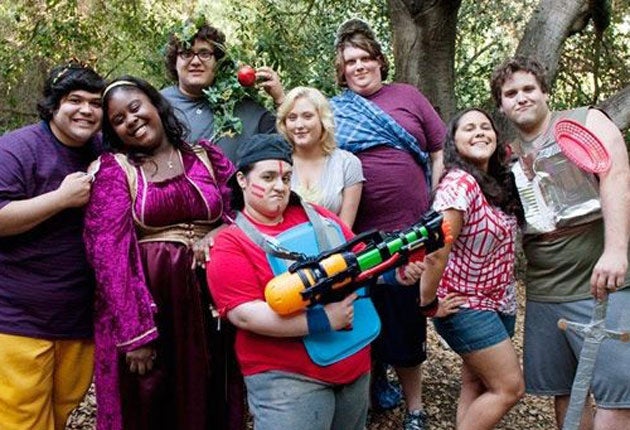How US TV is learning to have it large
Three new dramas with overweight protagonists are making their mark in the States, says Sarah Hughes. But how long can they last?

American television is no place for fat people. US audiences tend only to glimpse the overweight when they're being barked at by fitness instructors on The Biggest Loser or forced to shake their over-sized booty on the incredibly named Dance Your Ass Off.
In contrast to British television, which for all its flaws is occasionally prepared to acknowledge that actors do come in all shapes and sizes, American television is in thrall to the quest for perfection – and never more obviously than where actors' bodies are concerned.
Once in a while a US show will allow a larger man such as Jorge Garcia in Lost or Kevin James in King of Queens to wander on screen, but in a society where Mad Men's Christina Hendricks is seen as almost dangerously curvy, the chances of seeing an overweight woman are less than size zero.
Until now that is. For US TV has recently undergone something of a weight revolution, with not one but three shows featuring larger protagonists, and in the case of two of them at least, not bothering to make that big a deal about it.
First up was Drop Dead Diva, which managed to transcend a somewhat icky premise – model dies and finds herself trapped in the body of plus-sized lawyer – thanks to a sharp script and a winning central performance from Brooke Elliott. Still to come is CBS's new romantic comedy, Mike & Molly, in which the excellent Melissa McCarthy plays a teacher who gets together with a cop (Billy Gardell) at an Overeaters Anonymous meeting.
Judging from early clips, Mike & Molly (from the team behind Two and a Half Men) combines some good comic timing with some truly lamentable fat jokes, and thus serves mainly to remind us that it's 13 years since Roseanne Barr and John Goodman gave us a couple who were not only refreshingly unbothered by their weight, but also believably attracted to each other.
Sadly, in the years since Roseanne's heyday, US television has become increasingly convinced that attractive can only equal skinny. Thus the tiny Courteney Cox stares in a mirror in Cougar Town asking if her bottom is big, while the equally small Tina Fey jokes about weight issues on 30 Rock and any number of perfectly preserved, identically sized women drift across our screens in a bewildering prime-time remake of Attack of the Clones.
Thankfully, America's third, and best, new "fat" show is happy to challenge television's notions of beauty. Huge, which stars Hairspray's Nikki Blonsky and Hayley "daughter of David" Hasselhoff, is set in a weight-loss camp and is that rare thing: a likeable teenage drama in which the characters – from the would-be rebel to the shy eccentric and the popular kid – are refreshingly true to life.
Not for these teens the knowing irony of a Gossip Girl or the glossy melodrama of 90210. These are teenagers who look like teenagers, act like teenagers and best of all, talk like teenagers: not always coherently and with the wonderfully deluded belief that no one else feels quite as strongly as they do about life.

Watch Apple TV+ free for 7 days
New subscribers only. £8.99/mo. after free trial. Plan auto-renews until cancelled

Watch Apple TV+ free for 7 days
New subscribers only. £8.99/mo. after free trial. Plan auto-renews until cancelled
The strength of the show is largely down to a great script from Winnie Holzman, the creator of My So-Called Life, and her 25-year-old daughter, Savannah Dooley. Holzman and Dooley take what could be a mawkish subject matter – teenage obesity and the pressures the world puts on teens to conform – and subvert it at every turn.
Yes, the kids in Huge are supposed to lose weight, and yes the importance of health, fitness and the growing levels of teen obesity in the US are addressed, but weight loss is not presented as the answer to all life's problems. Instead, as US blogger Michelle Dean wrote recently: "The big value of Huge is that even as a so-called fat-acceptance show, the basis of the acceptance it advocates is the ability to transcend fat as self-definition. You can be overweight and love music; you can be overweight and love sports; you can be overweight and nonetheless be attractive to a thin person."
In other words, the wonderful and unusual thing about Huge is that it's an American television show in which fat people are used as more than a punchline, throwaway gag or sight joke. Unsurprisingly, it may not get renewed for a second season.
Subscribe to Independent Premium to bookmark this article
Want to bookmark your favourite articles and stories to read or reference later? Start your Independent Premium subscription today.

Join our commenting forum
Join thought-provoking conversations, follow other Independent readers and see their replies